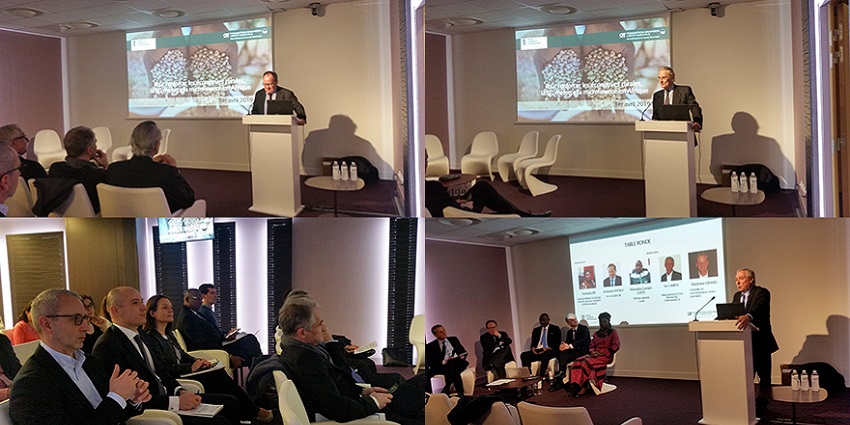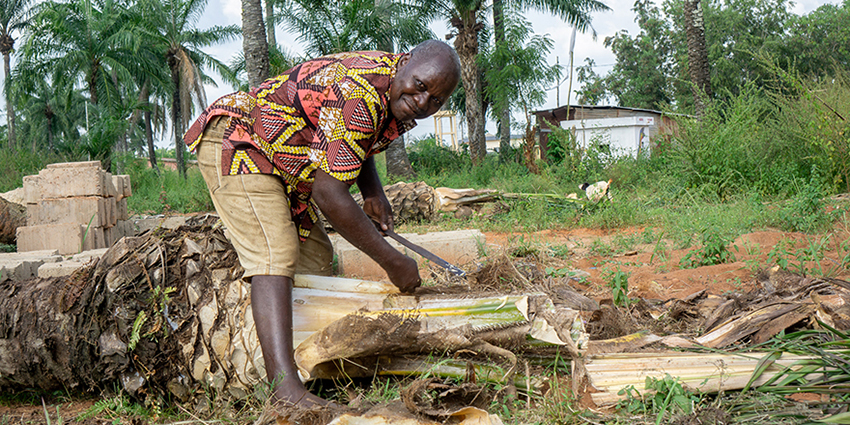11,3M€
Wallet
37 054
Number of beneficiaries
82%
Women beneficiaries
77 %
Rural beneficiaries
Benign
Financial services
Funding granted
Loan of €305,000*
(local currency equivalent)
Partner of the Foundation
since 2017
(2 loans granted)
*Outstanding at grant value
Context :
Benin's economy relies heavily on informal re-export and transit trade with Nigeria (estimated at approximately 20 billion GDP) as well as agriculture. Women are hampered by a lack of access to economic opportunities and underrepresented in senior positions.
The company:
The ACFB is a Tier 3 institution established in 1995 as part of a project by the local NGO GRAPAD, with support from CRS (Catholic Relief Services). Its mission is to promote low-income working populations, particularly women, by providing quality financial and non-financial services.
Impact :
The ACFB offers a diverse range of financial and non-financial services tailored to the needs of marginalized populations excluded from traditional financial systems. In its development strategy, the ACFB has successfully integrated a gender approach, making it a leading institution for the advancement of women and the development of microenterprises.
The Foundation and the EIB join forces to promote microfinance in Africa

© FGCA
On April 1, the Grameen Crédit Agricole Foundation and the European Investment Bank (EIB) held a roundtable discussion in Paris on the topic of developing rural economies and strengthening microfinance in Africa through the EIB. Representatives of both institutions shared a common goal: promoting a more sustainable and inclusive economy.
Following the EIB's granting of a €12 million loan equivalent in CFA francs to the Foundation to support microfinance in West Africa, this roundtable also provided an opportunity to discuss issues related to the development of rural areas in Africa. Several guests gathered to discuss rural microfinance, agriculture, gender, and climate change.
For the Foundation, recognition of expertise in microfinance
As Jérôme Brunel, Foundation Administrator and General Secretary of Crédit Agricole SA, recalled in his opening speech, the Foundation has lent more than four times its capital in the space of 10 years, representing €200 million in financing, for a presence in around thirty countries and more than 100 partners supported since 2008. At the end of 2018, the Foundation recorded an outstanding amount of €76 million and supported 75 partners in 35 countries. After excellent results in 2018, this new financing will therefore allow the Foundation to expand its action in Africa in the field of microfinance and support for social entrepreneurship. "With this financing granted to the Grameen Crédit Agricole Foundation, the European Investment Bank confirms its commitment to financial inclusion in West Africa alongside a committed player that has just celebrated its 10th anniversary," said Ambroise Fayolle, Vice-President of the EIB.
Mamadou Lamine Gueye, Managing Director of Caurie Microfinance, a Senegalese microfinance institution partnering with the Foundation and beneficiary of the EIB loan, and Soukeyna Ndiaye Bâ, Managing Director of the INAFI International Foundation and administrator of the Foundation, spoke of the importance of intermediaries such as the Grameen Crédit Agricole Foundation, whose positioning allows it to finance small microfinance institutions that would otherwise not be eligible for funding from major donors. Both agreed to recognize the role of the Foundation and other donors in developing the microfinance sector on the continent, thereby providing opportunities for African youth.
Two institutions have already benefited from the EIB loan to the Foundation: Caurie Microfinance, whose mission is the social and economic empowerment of poor microentrepreneurs in Senegal, primarily women; and PAMF BF, which offers microcredits to finance agricultural and economic activities such as market gardening and grain production in Burkina Faso. These two institutions alone represent more than 110,000 active borrowers, including 79,87% women.
Africa, a priority target for the Foundation
Sub-Saharan Africa accounts for approximately 301,000 million of the Foundation's funding. The Foundation focuses its efforts there on behalf of rural populations, with the aim of strengthening the resilience of the agricultural sector. "The Grameen Crédit Agricole Foundation is now present in a dozen African countries," emphasized Jean-Marie Sander, President of the Foundation. For Eric Campos, General Delegate of the Foundation, "working on agriculture means working on the future of Africa. We must unleash the development of products adapted to the rural world: today, agriculture represents 601,000 million of the continent's workforce. Yet farmers represent only 31,000 million of bank exhibitors!"
In line with the Foundation's work, microfinance is a fundamental pillar of value creation in Africa. This is also what two of our speakers, Flora Helard and Mathilde Thonon, students at Sciences Po Paris and co-founders of In-Venture, observed on the ground. They spent a year in West Africa and Southeast Asia meeting those who find solutions to their communities' social and environmental problems in finance. In particular, they met with two of the Foundation's partner MFIs in Benin: RENACA and ACFB. Their enthusiasm reflects the performance of a dynamic sector that attracts the young entrepreneurs of tomorrow.
The Foundation works for inclusive finance in Africa
By Mathilde Thonon and Flora Helard, In-Venture

© In venture
In Benin, more than half of the population lives in rural areas, far from the cities where most traditional banking services are concentrated. To address financial exclusion, microfinance institutions such as RENACA and ACFB have emerged across the country.
For many Beninese, it is difficult to both save and take out a loan. Lacking sufficient income and collateral, rural dwellers, as well as women and young workers, often find themselves deprived of financing that could help them start a business and contribute to Benin's economy. To address the exclusion of these populations, microfinance institutions such as RENACA and ACFB have emerged across the country.
The Grameen Crédit Agricole Foundation, a committed player in inclusive finance in rural areas, supports RENACA and ACFB in their mission to promote financial inclusion and entrepreneurship in Benin. Through its financial and technical support, the Foundation helps "restore hope to communities and lift populations out of a situation of vulnerability," explains Dieudonné Gnanvo, Director of RENACA. By offering savings, credit, and insurance products tailored to disadvantaged populations, microfinance institutions present an alternative to traditional banks and promote more inclusive and sustainable finance.
RENACA and ACFB, partners committed to the field
Founded in 2008, the National Network of Village and Self-Managed Credit Unions (RENACA) is one of the most active microfinance institutions in Benin. Since 2012, the Foundation has supported this mutual network, which has nearly 145,000 member clients, including 60% women. Present in 6 of the country's 12 regions, RENACA offers its clients individual and group loans and non-financial services such as training in personal and professional financial management. RENACA's social performance is an indicator of success, just as much as its financial performance. The institution places great importance on its customer relations and regularly monitors its contractors to ensure their gradual and sustainable exit from economic insecurity.
The Association of Grassroots Financing Funds (ACFB) emerged from a research and action NGO promoting development agriculture, which originally provided subsidies to women to help them start businesses. To sustain its impact, the NGO opted for microfinance over subsidies and gave way to the ACFB in 2004, which is now present in 44 of the country's 117 municipalities. Since 2016, the Foundation has supported the ACFB in its mission to promote women's entrepreneurship and the economic inclusion of local communities.
Modeled after Nobel Peace Prize winner Muhammad Yunus's Grameen Bank, ACFB specializes in group lending. This allows people without individual guarantees to borrow, since in exchange, the group must commit to repaying if one of its members is unable to do so. The mechanism thus draws its effectiveness from the bonds of trust and solidarity that exist between members, which encourage repayment: ACFB currently has a repayment rate of around 1,00%.
Promoting inclusive finance in Africa: a priority
The trusting and close relationships with clients, fostered by the establishment of numerous branches throughout the country, are also at the root of the success of ACFB and RENACA, which together have helped hundreds of thousands of Beninese secure a better future. With the support of the Grameen Crédit Agricole Foundation, the two microfinance institutions have enabled the development of numerous sustainable economic activities in sectors such as agriculture, access to water, renewable energy, crafts, and education in rural areas.
The Foundation works to develop inclusive finance beyond Benin's borders. Today, it focuses 35% of its commitments in sub-Saharan Africa and is present in a dozen African countries. Africa will continue to be a priority for the Foundation, which will focus 45% of its commitments on the continent by 2022.
